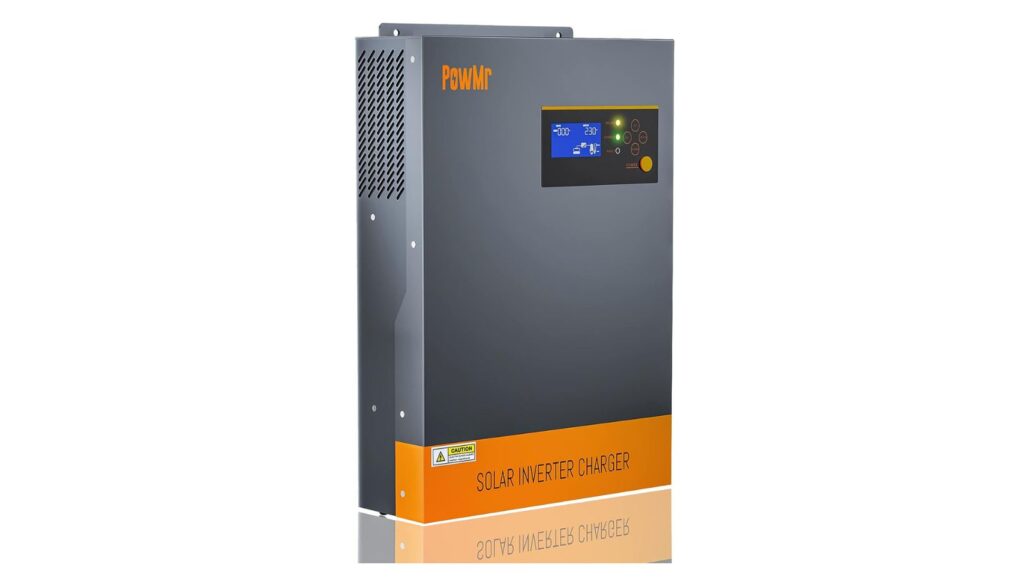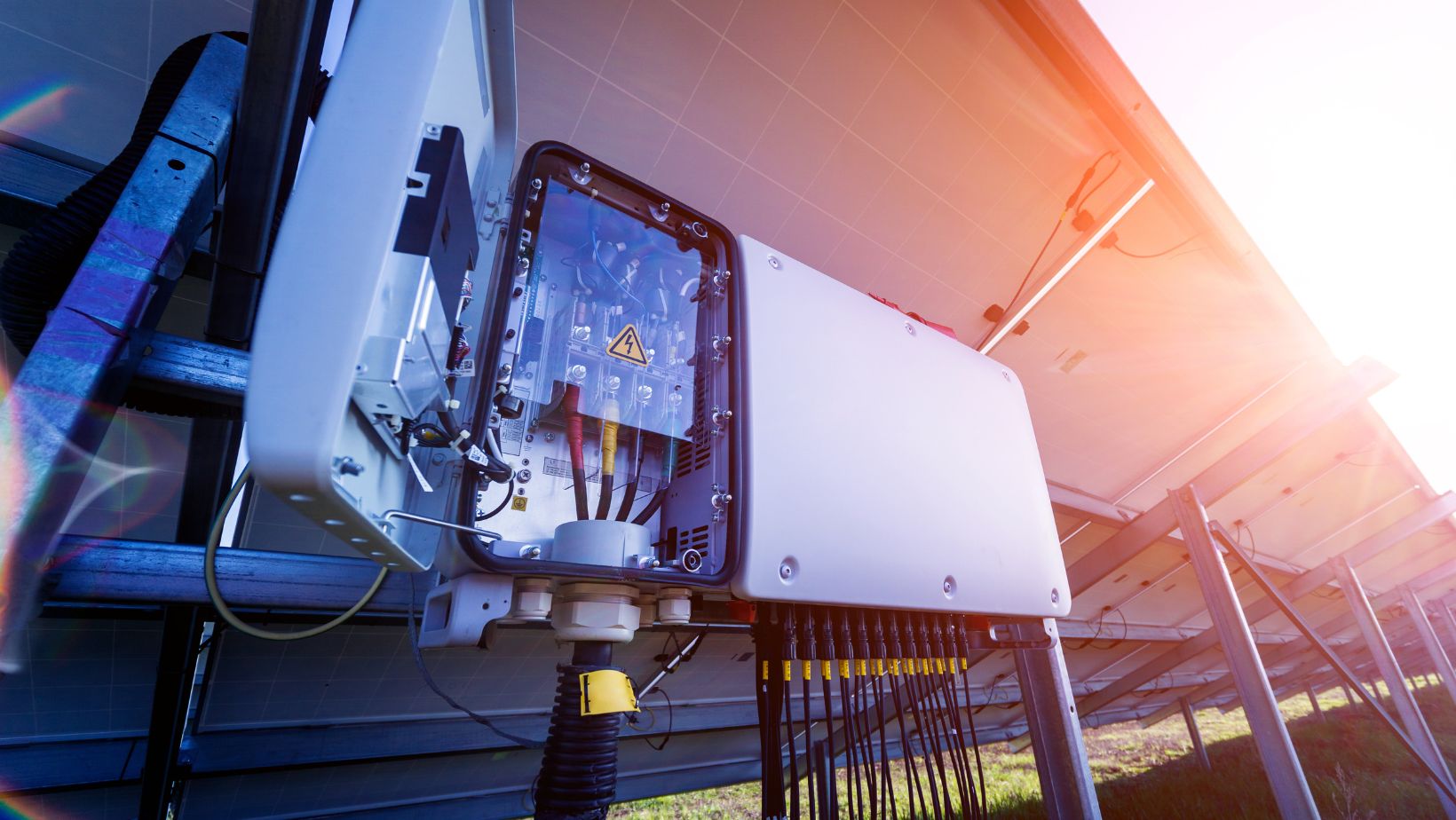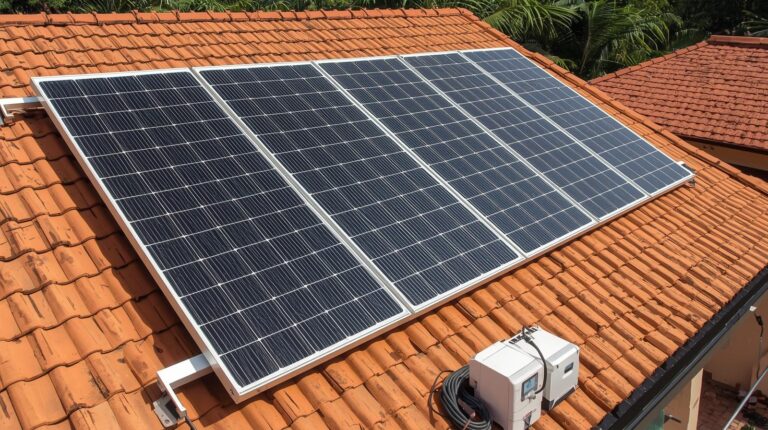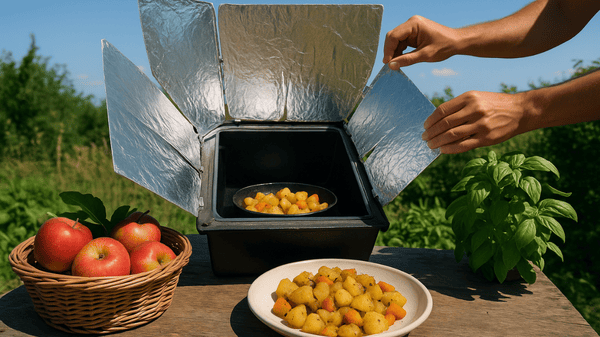Are you ready to join the solar energy revolution? Look no further than the hybrid solar inverter. This powerful device is the key to unlocking the full potential of your solar energy system. With their advanced technology and seamless integration, hybrid inverters offer unparalleled efficiency and reliability.
Whether you’re a seasoned solar enthusiast or just starting your journey, this comprehensive guide is for you. It will provide you with all the knowledge and insights you need to make the most of your solar investment. Get ready to take control of your energy future!
Key Takeaways
- Hybrid inverters combine solar and battery inverters into one unit. They’re allowing for seamless integration of solar power with the utility grid.
- They provide backup power during grid outages and maximize self-consumption of solar energy.
- Hybrid inverters offer advanced monitoring tools and real-time data on solar production, battery charge, and energy consumption.
- They contribute to a greener future by reducing reliance on the grid and optimizing energy usage through advanced features.
Overview of Hybrid Inverters
So, you want to learn about how hybrid inverters work and the functions and capabilities they offer? Well, let’s dive into it.
Hybrid inverters are a crucial component in solar energy systems. They combine the roles of both solar and battery inverters into a single unit. Convert the DC electricity generated by solar panels into AC electricity for use in your home. They also manage the conversion of DC electricity stored in batteries into usable AC electricity.
Additionally, these inverters allow for the seamless integration of solar power with the utility grid. This enables you to both draw power from the grid when needed and send excess electricity back to it. Understanding how hybrid inverters work and the functions they offer is essential for maximizing the benefits of solar energy systems.
Unleash the Power of the Sun with PowMr 5500W Solar Hybrid Inverter – The Ultimate Solution for Efficient and Sustainable Energy!

How Hybrid Inverters Work
Hybrid inverters work by converting DC electricity from solar panels into AC electricity for household use. They’re also enabling the flow of excess electricity back to the utility grid. They play a crucial role in maximizing the efficiency and usability of solar power systems.
Here’s how hybrid inverters work:
- DC to AC Conversion: Hybrid inverters take the direct current (DC) electricity produced by solar panels and convert it into alternating current (AC) electricity, which is the type of electricity used in homes and businesses.
- Grid Interaction: These inverters allow the excess electricity generated by solar panels to be sent back to the utility grid. This not only helps to offset the electricity consumption of the household but also allows the homeowner to earn credits or receive payments from the utility company for the excess energy produced.
- Battery Integration: Hybrid inverters also manage the conversion of DC electricity stored in batteries into usable AC electricity. This enables homeowners to have a reliable power source during grid outages or when the solar power is insufficient.
Hybrid inverters are an essential component of a hybrid solar power system. They’re providing flexibility, efficiency, and the ability to harness the maximum potential of solar energy.
Functions and Capabilities of Hybrid Inverters
Hybrid inverters have multiple functions and capabilities that make them an integral part of a solar power system.
A solar hybrid inverter is specifically designed to regulate and control the power supply from solar panels, ensuring efficient bi-directional DC to AC power conversion.
These hybrid inverters for solar also incorporate fault detection and system monitoring features, allowing for quick identification and resolution of any issues.
Additionally, they maximize power generation through the use of Maximum Power Point Trackers (MPPT), which optimize the output of the solar panels. This ensures that you can harness the maximum amount of energy from your solar system.
Furthermore, hybrid solar inverters often come equipped with a display screen or smartphone app, enabling you to monitor the power usage and generation of your system in real-time.
With these functions and capabilities, a hybrid inverter provides you with the peace of mind and control over your solar power system, making it an essential component for anyone seeking to harness the power of solar energy.
Types of Hybrid Inverters
When it comes to hybrid inverters, there are three key types to consider: the Inverter/Charger Hybrid, the Inverter/Charger/Solar Charge Integrated, and the Grid-Tie Hybrid.
The Inverter/Charger Hybrid is designed to convert DC power from batteries into AC power for use in your home, while also allowing for charging the batteries using AC power from the grid or a generator.
The Inverter/Charger/Solar Charge Integrated, on the other hand, not only charges the batteries using AC power, but also incorporates solar charge controllers to harness energy from solar panels.
Lastly, the Grid-Tie Hybrid is capable of not only converting DC power from batteries into AC power, but also seamlessly integrating with the grid, allowing for bidirectional power flow and the ability to sell excess energy back to the utility.
Inverter/Charger Hybrid
An inverter/charger hybrid combines the functionalities of a battery charger and an inverter. This innovative device is designed to be suitable for off-grid applications, providing a reliable and efficient solution for solar energy systems. With a hybrid inverter, you can not only convert DC power from your batteries into AC power for your appliances but also charge your batteries using AC power from an external source, such as a generator or the grid.
The hybrid inverter allows for seamless transition between grid power and battery power. It maximizes the use of renewable energy by intelligently managing the charging and discharging of batteries. It provides backup power during grid outages, ensuring uninterrupted electricity supply.
When it comes to choosing the best hybrid inverter for your needs, Growatt hybrid inverters are highly recommended. With their advanced features and reliable performance, Growatt hybrid inverters are trusted by homeowners and businesses alike. So, if you’re wondering what a hybrid inverter is and how it can benefit you, look no further than the Growatt hybrid inverter.
Inverter/Charger/Solar Charge Integrated
The inverter/charger/solar charge integrated device combines the functionalities of a battery charger and an inverter, making it a versatile and efficient solution for off-grid applications. This all-in-one device is designed to optimize the use of solar energy by incorporating built-in MPPT solar chargers. The space-saving design ensures that all components work together seamlessly, ensuring maximum performance and reliability.
One key advantage of this integrated device is its ability to provide a constant and reliable power supply, even in remote locations. It efficiently converts DC power from solar panels into AC power for use in various applications. Additionally, it can charge batteries from both solar energy and external power sources, ensuring a continuous power supply during periods of low solar availability.
For those concerned about environmental impact, this device offers a sustainable solution. It maximizes the use of renewable energy sources, reducing reliance on traditional power grids. Furthermore, it incorporates advanced cooling technology, such as hybrid inverter coolant, to ensure efficient operation and longevity of the device.
Grid-Tie Hybrid
Now that you understand the concept of an Inverter/Charger/Solar Charge Integrated system, let’s delve into the next subtopic: Grid-Tie Hybrid Inverter. This type of hybrid inverter allows you to connect your solar energy system to the power grid. Here are three key benefits of a Grid-Tie Hybrid inverter:
- Power Back to the Grid: With a Grid-Tie Hybrid inverter, any excess power generated by your solar panels can be sent back to the grid. This not only reduces your reliance on other sources but also contributes to the overall power supply.
- Cost Savings: By sending power back to the grid, you may be eligible for net metering, a process where you receive credits for the excess electricity you generate. These credits can then be used to offset your future electricity bills, resulting in potential cost savings.
- Belonging to the Grid: Being connected to the grid allows you to be part of a larger energy community. It gives you a sense of belonging and contributes to the collective effort of transitioning towards a more sustainable energy future.
Grid-Tie Hybrid inverters offer a seamless integration of solar power with the existing grid infrastructure, providing both economic and environmental benefits.
Related Post: Choosing the Best Solar Panel for You: Expert Tips & Advice.
Benefits and Considerations of Hybrid Inverters
When it comes to hybrid inverters, there are several advantages that make them a popular choice. One key advantage is their ability to seamlessly switch between grid power and battery power, providing uninterrupted electricity during power outages.
Additionally, hybrid inverters allow for the integration of renewable energy sources, such as solar panels, which can help reduce reliance on the grid and lower electricity bills. However, there are also important considerations to keep in mind when choosing a hybrid inverter.
These considerations include the maximum power output, battery compatibility, and the efficiency of the inverter.
Advantages of Hybrid Inverters
Get ready to discover the numerous advantages of hybrid inverters for maximizing self-consumption and reducing energy costs. Hybrid inverters are a game-changer in the solar energy revolution, offering a range of benefits that can transform the way you use and save energy. Here are three key advantages of hybrid inverters:
- Maximizing self-consumption: Hybrid inverters allow you to harness the power of your solar panels and use it directly in your home, reducing your reliance on the grid. This means you can consume more of the solar energy you generate, leading to significant savings on your electricity bills.
- Backup power during outages: With a hybrid inverter, you can have peace of mind knowing that you’ll still have power during grid outages. By integrating batteries into the system, the inverter can store excess energy and use it to power your home when the grid is down.
- Optimizing energy usage: Hybrid inverters come with advanced features for remote monitoring and energy optimization. You can easily track your energy production and consumption, enabling you to make informed decisions about when to use appliances and devices to maximize your energy efficiency.
With these advantages, hybrid inverters offer a sustainable and cost-effective solution for homeowners looking to reduce their energy costs and contribute to a greener future.
Considerations for Choosing a Hybrid Inverter
To ensure you choose the right hybrid inverter for your needs, it’s important to consider factors such as power capacity, compatibility with batteries, certifications and warranties, available features, and overall cost-effectiveness.
When determining the power capacity, you must consider your energy needs and the size of your solar panel system. It is crucial to ensure that the hybrid inverter is compatible with the type and capacity of batteries you plan to use.
Certifications and warranties are important indicators of the quality and reliability of the inverter. Look for certifications from reputable organizations in the industry. Evaluating the available features and functionalities will help you determine if the inverter meets your specific requirements.
Lastly, compare prices and assess the overall cost-effectiveness of the inverter, taking into account its capabilities and long-term benefits.
Hybrid Solar Inverters
When it comes to hybrid solar inverters, understanding their introduction, functions, and capabilities is essential. These inverters combine the benefits of both grid-tied and off-grid systems, allowing you to use solar power and store excess energy in batteries for later use.
Their functions include converting DC power from solar panels into AC power for use in your home, managing the flow of electricity between the solar panels, batteries, and the grid, and providing backup power during grid outages. However, it’s important to weigh the pros and cons of hybrid solar inverters.
Some pros include the ability to use solar power and store excess energy, as well as providing backup power during outages. However, there are also cons to consider. Hybrid solar inverters tend to have a higher cost compared to traditional inverters, and they require regular battery maintenance.
Overall, understanding the functions and capabilities of hybrid solar inverters will help you make an informed decision about whether they are the right choice for your solar power system.
Introduction to Hybrid Solar Inverters
You can easily harness the power of both solar panels and batteries with a hybrid solar inverter. This innovative device combines the functionalities of a solar inverter and a battery inverter, allowing you to efficiently manage the power generated by your solar panels, the energy stored in your batteries, and even the power from the utility grid.
With a hybrid solar inverter, you have the ability to optimize your energy usage, reduce reliance on the grid, and maximize your savings. Here are three key features and benefits of hybrid solar inverters:
- Seamless integration: A hybrid inverter seamlessly integrates with your solar panels, batteries, and the grid, ensuring a smooth flow of power and maximizing the efficiency of your energy system.
- Energy independence: By combining solar panels and batteries, a hybrid inverter empowers you to become more self-reliant and less dependent on the grid, giving you greater control over your energy usage and reducing your carbon footprint.
- Backup power: During power outages, a hybrid inverter can automatically switch to battery power, providing you with a reliable backup source of electricity.
With a hybrid solar inverter, you can take a significant step towards a more sustainable and cost-effective energy solution, while also contributing to the renewable energy revolution.
Functions and Capabilities of Hybrid Solar Inverters
Now that you have been introduced to hybrid solar inverters, let’s delve into their functions and capabilities. These advanced devices perform a range of tasks to ensure efficient and seamless integration of solar energy into your power system.
One of the primary functions of a hybrid solar inverter is DC-to-AC bi-directional power conversion. This means that it can convert direct current (DC) power generated by your solar panels into alternating current (AC) power that can be used to power your appliances, and also convert excess AC power back into DC for battery storage.
In addition to power conversion, hybrid inverters also regulate and detect faults in the power system. They are equipped with advanced monitoring and control features that allow them to identify any issues and take corrective actions to ensure optimal performance and safety.
Moreover, hybrid inverters maximize power generation by employing Maximum Power Point Tracking (MPPT) technology. This enables them to constantly track the maximum power output of your solar panels and adjust their operations accordingly, ensuring that you extract the most energy from the sun.
Furthermore, hybrid solar inverters have both off-grid and on-grid capabilities. This means that they can operate independently, utilizing stored energy from batteries when there is no grid connection, or seamlessly integrate with the grid, allowing you to sell excess power back to the utility company.
Pros and Cons of Hybrid Solar Inverters
Take into consideration the advantages and disadvantages of using hybrid solar inverters in your power system.
Hybrid solar inverters offer several benefits that can enhance your energy system. Firstly, they provide power resiliency during blackouts by automatically switching to battery backup when the grid goes down.
Secondly, these inverters allow for easy retrofitting of battery storage, enabling you to store excess solar energy for later use. Lastly, hybrid inverters simplify energy monitoring by providing real-time data on solar production, battery charge, and energy consumption.
However, there are also some drawbacks to consider. Limited design flexibility and battery compatibility concerns may restrict your options when installing a hybrid inverter. Additionally, hybrid inverters have higher initial costs compared to traditional inverters.
Despite these disadvantages, hybrid solar inverters offer a reliable and efficient solution for integrating solar energy into your power system.
Additional Benefits and Considerations of Hybrid Solar Inverters
Imagine how convenient it would be to have backup power during outages or peak hours with a hybrid solar inverter. Not only does it provide a reliable source of electricity when the grid fails, but it also allows you to maximize the use of solar energy.
Hybrid solar inverters have the capability to store excess energy generated by your solar panels, ensuring that it is available for future consumption. This means you can use solar power even when the sun isn’t shining or during times of high energy demand.
By utilizing a hybrid solar inverter, you can achieve a fully off-grid system, gaining independence in power generation. This not only reduces your reliance on the grid but also helps to reduce your carbon footprint.
Furthermore, hybrid solar inverters come equipped with advanced monitoring tools, allowing you to track and optimize your power generation. With these additional benefits and considerations, a hybrid solar inverter is a valuable investment for those seeking to harness the power of solar energy.
Unleash the Power of the Sun with the PowMr 5500W Solar Hybrid Inverter: Harness Renewable Energy for Efficient, Eco-Friendly Power!

Frequently Asked Questions
How Long Does a Hybrid Inverter Typically Last?
A hybrid inverter typically lasts between 10 to 20 years, depending on various factors such as usage, maintenance, and quality. Regular inspections and proper care can extend its lifespan, ensuring reliable performance for your solar energy system.
Can a Hybrid Inverter Be Used in Conjunction With a Backup Generator?
Yes, a hybrid inverter can be used in conjunction with a backup generator. It allows you to seamlessly switch between solar power and generator power, providing uninterrupted electricity supply during power outages.
Are Hybrid Inverters Compatible With All Types of Solar Panels?
Hybrid inverters are compatible with most types of solar panels, making them a versatile option for your solar energy system. They allow you to maximize energy production and seamlessly integrate with different panel technologies.
Can we use a Hybrid Solar Inverter in Off-Grid Solar Systems?
Yes, you can use a hybrid inverter in off-grid solar systems. It allows you to convert and store excess solar energy in batteries, providing power during periods of low or no sunlight.
Are There Any Government Incentives or Rebates Available for Installing a Hybrid Inverter?
Yes, there are government incentives and rebates available for installing a hybrid inverter. You can save up to 30% on installation costs through the Federal Investment Tax Credit and take advantage of state-specific incentives as well.
Conclusion
Congratulations! You’ve reached the end of our ultimate guide to hybrid inverters. Armed with this knowledge, you’re ready to embark on a solar energy revolution. By utilizing the power of hybrid inverters, you can seamlessly integrate renewable energy into your daily life. Say goodbye to hefty energy bills and hello to a greener future.
Remember, the choice is yours. Will you join the revolution or be left in the shadows of outdated technology? The power is in your hands.




